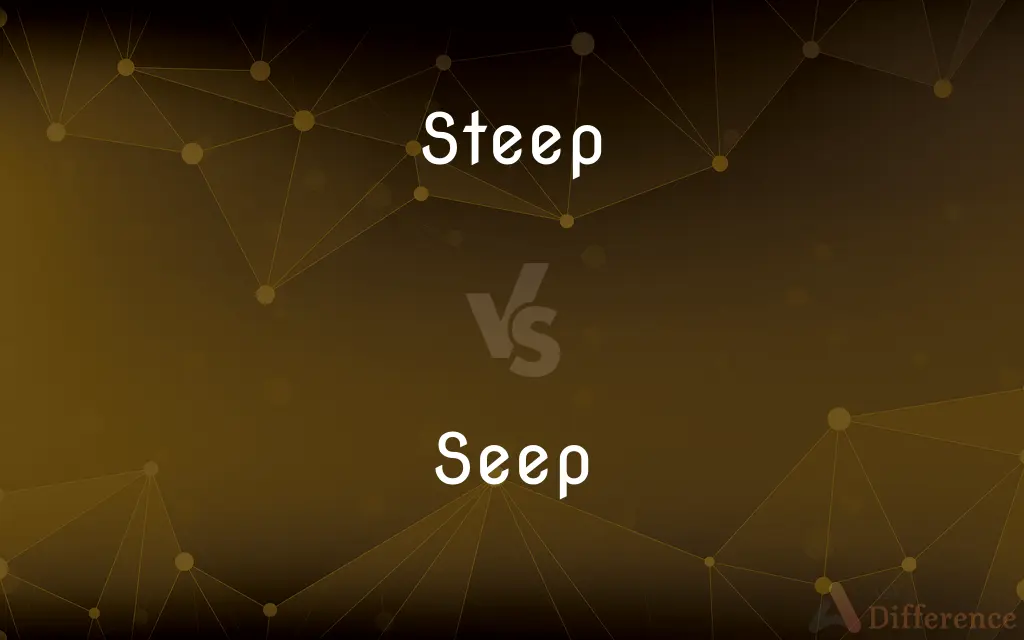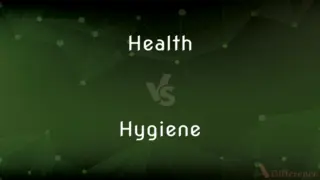Steep vs. Seep — What's the Difference?
Edited by Tayyaba Rehman — By Urooj Arif — Updated on March 17, 2024
"Steep" implies soaking something in liquid to extract flavors or soften it, often used in cooking or tea making, while "seep" refers to the gradual movement of liquid through a permeable substance, highlighting a slow, infiltrative process.

Difference Between Steep and Seep
Table of Contents
ADVERTISEMENT
Key Differences
Steep is a term often associated with the process of immersing substances like tea leaves, herbs, or grains in hot water for a period of time, allowing flavors, nutrients, or colors to infuse the liquid. This method is essential in culinary practices, tea preparation, and even in some industrial processes where extracting specific compounds is necessary. On the other hand, seep describes a slower, more passive movement of liquid, usually water, through porous materials or small openings. It's a term frequently used in environmental science, geology, and construction, signifying the movement of moisture through soil, rocks, or barriers, which can have implications for structures, landscapes, and water quality.
While steeping is a deliberate action undertaken to achieve a desired outcome, such as brewing tea or marinating food, seeping is often a natural or unintended process where liquid moves according to gravitational pull and the permeability of materials. Steeping requires a certain amount of control over time, temperature, and the proportion of solid to liquid to ensure the desired extraction. Conversely, seeping is influenced by external factors like material composition, saturation levels, and environmental conditions, which are not controlled but observed and managed.
In the culinary world, steeping is crucial for flavor development. The technique is applied not just in making beverages but also in extracting flavors for broths, infusions, and even in some fermentation processes. Whereas, seeping might be discussed in the context of problems or considerations, such as water seepage into basements, the efficacy of drainage systems, or the migration of contaminants through soil.
The outcome of steeping is typically something to be consumed or used immediately, like a cup of tea or a flavorful broth. In contrast, the effects of seeping might not be immediately apparent and can result in long-term environmental or structural changes, such as erosion, foundation weakening, or the gradual accumulation of water in areas where it’s not wanted.
Both processes, though differing significantly in their application and implications, highlight the transformative power of water. Steep transforms through immersion and extraction, bringing out flavors, aromas, or medicinal qualities. Seep, on the other hand, demonstrates water's ability to penetrate and move through substances, altering landscapes and environments over time.
ADVERTISEMENT
Comparison Chart
Definition
Immersing in liquid to extract flavor or soften.
Gradual movement of liquid through something.
Application
Culinary, tea making, industrial extraction.
Environmental science, geology, construction.
Process
Deliberate, controlled immersion.
Natural, uncontrolled movement.
Influence Factors
Time, temperature, solid-to-liquid ratio.
Material permeability, gravity, environmental conditions.
Outcome
Immediate, consumable results.
Long-term, often environmental or structural impact.
Compare with Definitions
Steep
To let sit in a liquid to infuse.
The berries were steeped in sugar syrup to sweeten them.
Seep
To ooze or leak through slowly.
The tea seeped out of the torn bag, leaving a stain.
Steep
A process of soaking to develop taste or medicinal properties.
The chef let the spices steep in the broth overnight.
Seep
The process of liquid moving slowly by infiltration.
Oil seeped out of the storage tank into the ground.
Steep
The act of softening or extracting by soaking.
Steep the grains in hot water to start the brewing process.
Seep
The act of permeating slowly.
The fragrance of the flowers seeped into the room through the open window.
Steep
To immerse in hot water to extract flavor or soften.
She decided to steep the herbs for a stronger tea.
Seep
To slowly pass through a porous material or small holes.
Water began to seep through the cracks in the foundation.
Steep
Involving immersion in liquid.
Steep the cloth in dye for an hour to achieve the desired color.
Seep
A gradual movement of liquid without force.
After the rain, moisture seeped into the soil, nourishing the roots.
Steep
Having a sharp inclination; precipitous.
Seep
To pass slowly through small openings or pores; ooze
Water is seeping into the basement.
Steep
At a rapid or precipitous rate
A steep rise in imports.
Seep
To enter, depart, or become diffused gradually
The importance of the situation finally seeped into my brain. The news seeped out bit by bit.
Steep
Excessive; stiff
A steep price.
Seep
A place on land or underwater where a liquid or gas oozes out of the ground.
Steep
Ambitious; difficult
A steep undertaking.
Seep
(intransitive) To ooze or pass slowly through pores or other small openings, and in overly small quantities; said of liquids, etc.
Water has seeped through the roof.
The water steadily seeped in through the thirl.
Steep
A precipitous slope.
Seep
To enter or penetrate slowly; to spread or diffuse.
Woe seeped through her heart thinking of what had befallen their ethnic group.
Fear began to seep into the local community over the contamination of their fishpond.
Steep
The act or process of steeping.
Seep
To diminish or wane away slowly.
The resistance movement against the invaders had slowly seeped away.
Steep
The state of being steeped.
Seep
(transitive) (of a crack etc.) To allow a liquid to pass through, to leak.
The crack is seeping water.
Steep
A liquid, bath, or solution in which something is steeped.
Seep
A small spring, pool, or other spot where liquid from the ground (e.g. water, petroleum or tar) has oozed to the surface; a place of seeping.
Steep
To immerse in liquid for a period of time, as to cleanse, treat, or extract a given property from
Steeped the cloth in red dye.
Steeped the tea bag in boiling water.
Seep
Moisture, liquid, gas, etc. that seeps out; a seepage.
Steep
To involve or preoccupy thoroughly; immerse
As a child, she steeped herself in adventure stories.
Seep
The seeping away of a liquid, etc.
Steep
To make thoroughly wet; saturate.
Seep
A seafloor vent.
Steep
To undergo a soaking in liquid
Let the tea steep for five minutes.
Seep
To run or soak through fine pores and interstices; to ooze.
Water seeps up through the sidewalks.
Steep
Of a near-vertical gradient; of a slope, surface, curve, etc. that proceeds upward at an angle near vertical.
A steep hill or mountain; a steep roof; a steep ascent; a steep barometric gradient
Seep
Pass gradually or leak through or as if through small openings
Steep
(informal) expensive
Twenty quid for a shave? That's a bit steep.
Steep
(obsolete) Difficult to access; not easy reached; lofty; elevated; high.
Steep
(of the rake of a ship's mast, or a car's windshield) resulting in a mast or windshield angle that strongly diverges from the perpendicular
The steep rake of the windshield enhances the fast lines of the exterior.
Steep
The steep side of a mountain etc.; a slope or acclivity.
Steep
A liquid used in a steeping process
Corn steep has many industrial uses.
Steep
A rennet bag.
Steep
To soak or wet thoroughly.
They steep skins in a tanning solution to create leather.
The tea is steeping.
Steep
To imbue with something; to be deeply immersed in.
A town steeped in history
Steep
To make tea (or other beverage) by placing leaves in hot water.
Steep
Bright; glittering; fiery.
His eyen steep, and rolling in his head.
Steep
Making a large angle with the plane of the horizon; ascending or descending rapidly with respect to a horizontal line or a level; precipitous; as, a steep hill or mountain; a steep roof; a steep ascent; a steep declivity; a steep barometric gradient.
Steep
Difficult of access; not easily reached; lofty; elevated; high.
Steep
Excessive; as, a steep price.
Steep
To soak in a liquid; to macerate; to extract the essence of by soaking; as, to soften seed by steeping it in water. Often used figuratively.
Let fancy still my sense in Lethe steep.
In refreshing dew to steepThe little, trembling flowers.
The learned of the nation were steeped in Latin.
Steep
To undergo the process of soaking in a liquid; as, the tea is steeping.
Steep
Something steeped, or used in steeping; a fertilizing liquid to hasten the germination of seeds.
Steep
A rennet bag.
Steep
A precipitous place, hill, mountain, rock, or ascent; any elevated object sloping with a large angle to the plane of the horizon; a precipice.
We had on each side naked rocks and mountains broken into a thousand irregular steeps and precipices.
Bare steeps, where desolation stalks.
Steep
A steep place (as on a hill)
Steep
Engross (oneself) fully;
He immersed himself into his studies
Steep
Let sit in a liquid to extract a flavor or to cleanse;
Steep the blossoms in oil
Steep the fruit in alcohol
Steep
Having a sharp inclination;
The steep attic stairs
Steep cliffs
Steep
Greatly exceeding bounds of reason or moderation;
Exorbitant rent
Extortionate prices
Spends an outrageous amount on entertainment
Usorious interest rate
Unconscionable spending
Steep
Of a slope; set at a high angle;
Note the steep incline
A steep roof sheds snow
Common Curiosities
What causes water to seep into basements?
Water can seep into basements through cracks, pores in the concrete, or due to poor drainage around the building, often after heavy rain or snowmelt.
How does water seep through soil?
Water seeps through soil by slowly moving through the spaces between soil particles, a process influenced by gravity and soil permeability.
What does it mean to steep tea?
Steeping tea involves soaking tea leaves in hot water to extract their flavors, aromas, and colors, creating a drink.
Is steeping tea the same as brewing tea?
Steeping is part of the brewing process, specifically the act of soaking the tea in water. Brewing encompasses the entire process, including measuring the tea, heating the water, steeping, and serving.
Why is it important to manage seepage in construction?
Managing seepage prevents water damage to structures, controls erosion, and reduces the risk of mold and mildew growth, ensuring structural integrity and health safety.
What environmental impacts does seeping have?
Seeping can affect water quality, soil stability, plant growth, and the distribution of nutrients and pollutants in the environment.
Can you steep fruits?
Yes, fruits can be steeped in liquids like alcohol or syrup to infuse flavors or create preserves.
Can steeping affect the nutritional value of food?
Yes, steeping can affect nutritional value, either by extracting beneficial nutrients and compounds or, in some cases, reducing certain nutrients due to prolonged exposure to water.
Can spices be steeped?
Yes, spices can be steeped in liquids like water, oil, or alcohol to extract their flavors and aromas for culinary use.
How do you prevent seepage in buildings?
Preventing seepage involves waterproofing, improving drainage, sealing cracks, and ensuring proper construction techniques and materials.
Share Your Discovery

Previous Comparison
Photoheterotroph vs. Photoautotroph
Next Comparison
Health vs. HygieneAuthor Spotlight
Written by
Urooj ArifUrooj is a skilled content writer at Ask Difference, known for her exceptional ability to simplify complex topics into engaging and informative content. With a passion for research and a flair for clear, concise writing, she consistently delivers articles that resonate with our diverse audience.
Edited by
Tayyaba RehmanTayyaba Rehman is a distinguished writer, currently serving as a primary contributor to askdifference.com. As a researcher in semantics and etymology, Tayyaba's passion for the complexity of languages and their distinctions has found a perfect home on the platform. Tayyaba delves into the intricacies of language, distinguishing between commonly confused words and phrases, thereby providing clarity for readers worldwide.














































